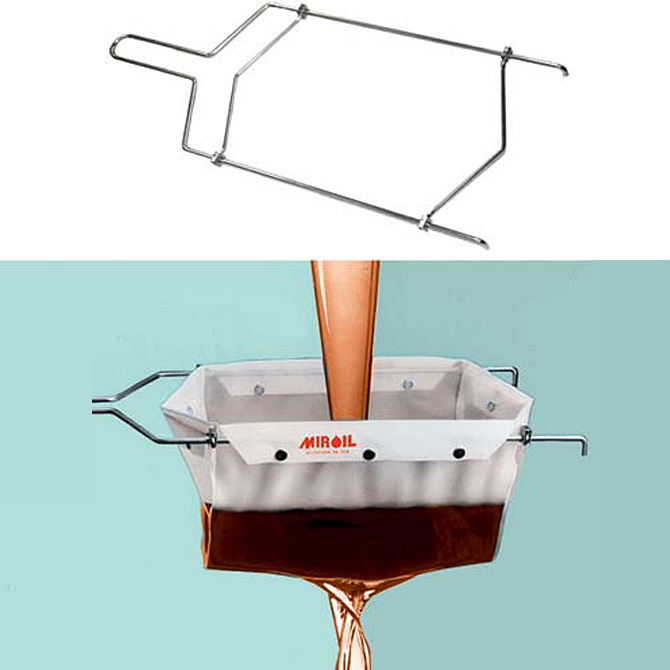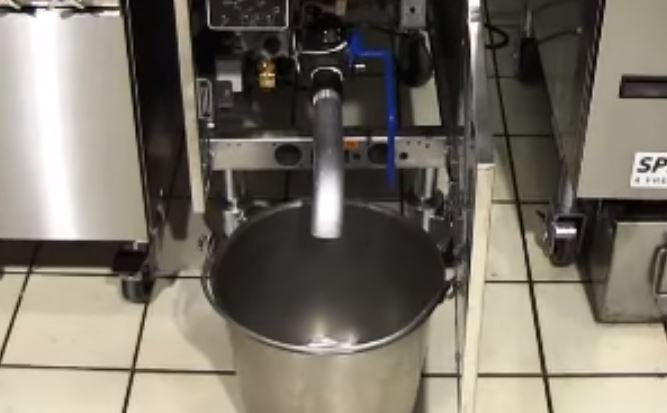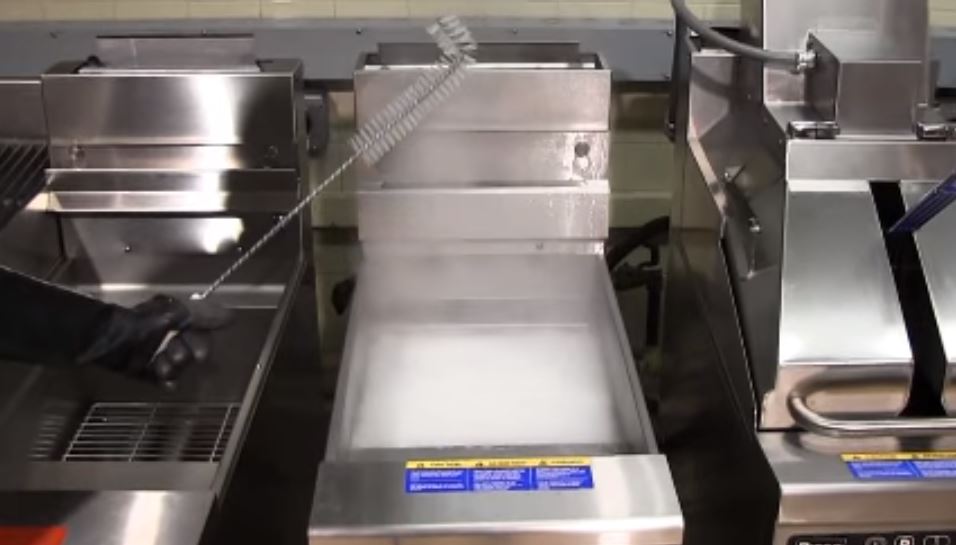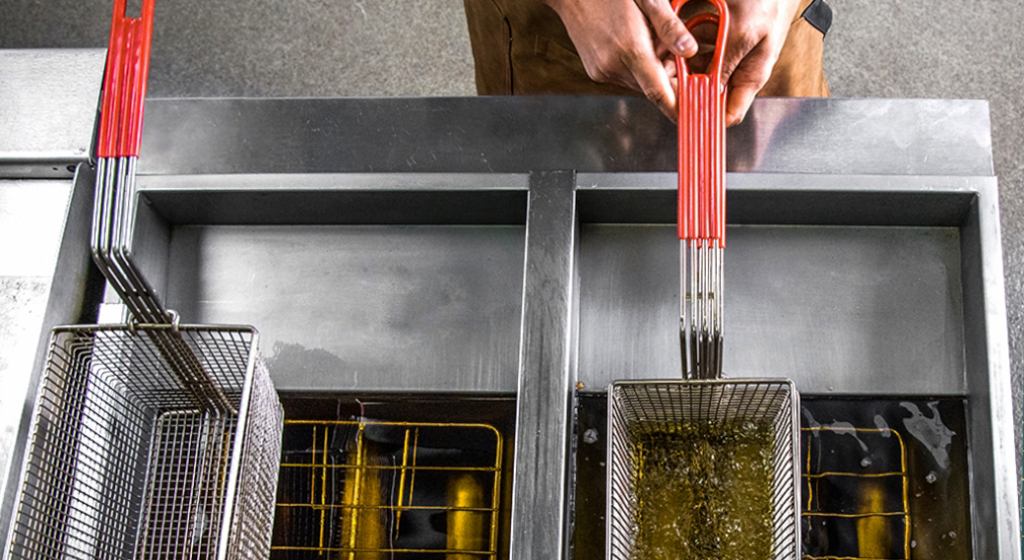You’ve carefully figured out what type of commercial fryer you need. And you purchased the fryer with the best size and fuel type. To make sure your new fryer lasts for years, you now want to educate yourself on fryer maintenance. And as food service managers know, it is very important to keep your commercial fryer properly cleaned. Comprehensive fryer maintenance encompasses everything from the oil or shortening to the baskets, oil well and heating tubes.
Maintaining your restaurant fryer will extend the life of your oil as well as your equipment. Just as important, your food will taste better, ensuring your customers keep coming back for your quality fried menu items.
Fryer Oil Maintenance
It’s absolutely crucial to take care of the oil you put in your fryer. Fryer oil is also referred to as “shortening.” Properly maintaining your oil will ensure the flavors of your food taste fresh batch after batch. Commercial fryer oil bookends your maintenance process. Thorough fryer maintenance begins with extracting dirty oil, and it ends with adding clean oil.
Positive Cooking Habits
Maintaining your fryer oil consists of a collection of positive cooking habits that take place all day long.
- Shaking off ice crystals before frying frozen food products.
- Not salting food above the fryer oil can reduce debris.
- Filtering your oil at least once a day and more often as necessary can increase oil longevity.
- Using a skimmer to pull larger sediments out of the oil can buy you some time before filtering the oil is necessary.
- Allowing your oil to cool below cooking temperatures during slower hours of the day can reduce the rate at which your oil breaks down.
Long-Term Benefits of Oil Maintenance
Oil maintenance is a cooking lifestyle that will save you money. Training cooks that are new to using commercial deep fryers is well worth your time and effort.
The quality of your oil is reflected in the flavor of your food. If you take care of your oil, it may only need replaced once a week. However, you may need to replace the oil more frequently depending on the volume of fried food you serve.
| Fryer "Do's" | Fryer "Don'ts" |
|---|---|
| Do shake off ice crystals before frying frozen food. | Don't salt or season food directly above your fryer. |
| Do adjust oil temperatures for different products for best results. | Don't keep your fryer oil at cooking temperatures all day. (unless you have to!) |
| Do add oil throughout the day as needed to ensure your fryer can cook at capacity. | Don't neglect to filter oil as needed throughout the day. Plan ahead. |
| Do allow your fryer oil to rest and recover so it can remain at cooking temperatures. | Don't make soggy fries by cooking food faster than your deep fryer can recover. |
Filtering Your Oil / Shortening
Before you can begin cleaning your fryer well, you need to remove the oil from your tank. This is the perfect time to filter your oil, even if you’ve already filtered it for the day. You really can’t over-filter your oil. If your restaurant has a lot of fried appetizers and entrees, you will want to invest in a mechanical fryer oil filter machine. Oil Filter machines will save you time and are safer than filtering large amounts of oil by hand.

Another method to filter your oil, is manual filtration using filter paper or bags. Often, these filters are paired with a stainless steel frame and pot. Often times these can be placed below your fryer’s drain tube. Reusable, paperless filters are available and can cut filter costs in half. For venues serving large amounts of fried food and require their fryer oil to be filtered frequently, a mechanical solution may be for you.
Always remember that the oil in your fryer is HOT and will cause severe burns if you do not take the necessary precautions. Always wear the appropriate gloves, apron and face protection when draining, filtering and replacing your oil.

Cleaning the Fryer Oil Well
After you have drained and filtered your oil, it’s time to clean the oil well!
5 Tips for Cleaning Your Oil Well
You’ll develop your own tips and tricks as you maintain your restaurant fryer, but here are a few from the pro’s to get you started:
- Right after draining your oil, pour a little of the hot oil back into the tank to drain sediment out of your drain tube.
- You can also pour a little hot oil over spots on the heating tubes that have stubborn sediment.
- Scrub with your fryer brush and never use a metallic scouring pad. You don’t want to damage the heating tubes and metal surfaces.
- Always start with a soft, damp cloth to wipe sediment out of the corners of the well and on the heating tubes. Don’t use cloth that frays or breaks apart.
- Don’t forget to wipe along the grain of the heating tube steel for best results.
Shop All Fryer Accessories »
For stubborn grease, you can re-apply a little hot oil that was drained and scrub again with a fryer brush or cloth. If you do not regularly clean your oil well, grease and sediment will burn onto the metal surfaces. As this burnt grease accumulates, it will make fryer maintenance more difficult. Another way to help mitigate this, it is recommended to perform a boil out procedure once a week.

Don’t Forget to Boil-Out!
Once a week or as needed, you should reference your fryer’s owners manual to perform a full tank cleaning using a boil out solution. This is a critical part of maintaining your fryer. Performing a full-tank cleanse preserves the taste of your fried food by removing old oil and stubborn, burnt-on sediments.
Performing this procedure requires specific cleaning chemicals and takes more time than your daily cleaning. However the benefits are enormous and well worth your time. Be sure to follow the boil out process in your fryer manual carefully, and your food will always taste like it was cooked in a new fryer month after month.
What are the most common mistakes people make when cooking with a fryer?
There are 3 mistakes most cooks will make if they are new to cooking with a commercial fryer. Although common, they can make fryer maintenance more challanging. Here are a few Pro Tips from your friends at Wasserstrom:
#1 – Cooking too much food at once. – This lowers the temperature of the oil and makes for unevenly cooked and even soggy food. (Also see, “How to Avoid Soggy French Fries.”)
#2 – Allowing your oil to get too hot. Overheating your oil will cause your fried foods to cook too quickly, often resulting in the outside burning without the food being safely cooked through. There is an optimal cooking temperature for most foods, and that is between 350 – 375 °F. Invest in an oil thermometer as well as one for your meats. Overheating your oil will also cause it to break down faster, increasing how much oil you use.
#3 – Improper oil use and maintenance. Reusing oil too often, using the oil you fried fish in for your chicken, using lower quality oils with low smoke points – taking care of your oil will save you time and keep your food textures crisp and your flavors consistent.
#4 – NEVER put a grease or oil fire out with water. Water will vaporize when it contacts the hot oil, splatter and spread the fire quickly.
#5 – Setup your fryer away from equipment that frequently produces flames. Oil is very flammable and can flare-up when it comes in contact with open flames.
#6 – Don’t put wet food in a fryer. Again, the water will vaporize, splattering the hot oil.




To have the perfect result in terms of food, it is critical to use the proper oil in deep fryers. And in case of fryers, it is all about longevity and consistency, and ultimately the best quality of food. With the market for deep fryers growing globally, especially in the Asia-Pacific region, according to a Grand View Research report, these tips would definitely help commercial establishments as well as households in keeping their fryers in the best possible condition.